Using sEMG for Disordered Speech Enhancement III -- Adaptive Threshold
- Status
- Finished
- Type
- Bachelor Project
- Announcement date
- 10 Mar 2015
- Student
- Andreas Fuchs
- Mentors
- Research Areas

Short description
An electro-larynx is a device which is used to re-obtain speech after removal of the larynx. It is a small hand-held, battery-driven device and its resulting speech suffer from unnaturalness.
It turned out that surface electromyography (sEMG), i.d. muscle activity at the neck, is a possibility to control the on/off signal of the device in an automatic way without occupying one hand. In previous work we developed a hardware to capture sEMG signal and implemented a real-time system to operate the EL device in a hands-free way [1]. The threshold to turn on and off the EL device depends on the SNR of the EMG signal which is, in turn, speaker dependent.
Your Tasks
- Review of literature
- MATLAB implementation of adaptive threshold to operate the EL device
- Documentation
Your Profile/Prerequisites
- Motivation and interest in the topic
- Background information in Matlab and (speech) signal processing
Contact:
Martin Hagmüller ({hagmueller}@tugraz.at or 0316/873 4377) Anna Katharina Fuchs ({anna.fuchs}@tugraz.at or 0316/873 4367)
References:
[1]A. K. Fuchs, C. Amon, and M. Hagmüller, “Speech/non-speech detection for electro-larynx speech using emg,” in Biosignals - 8th International Conference on Bio-Inspired and Signal Processing (BIOSIGNALS 2015), 2015, pp. 138 – 144.
